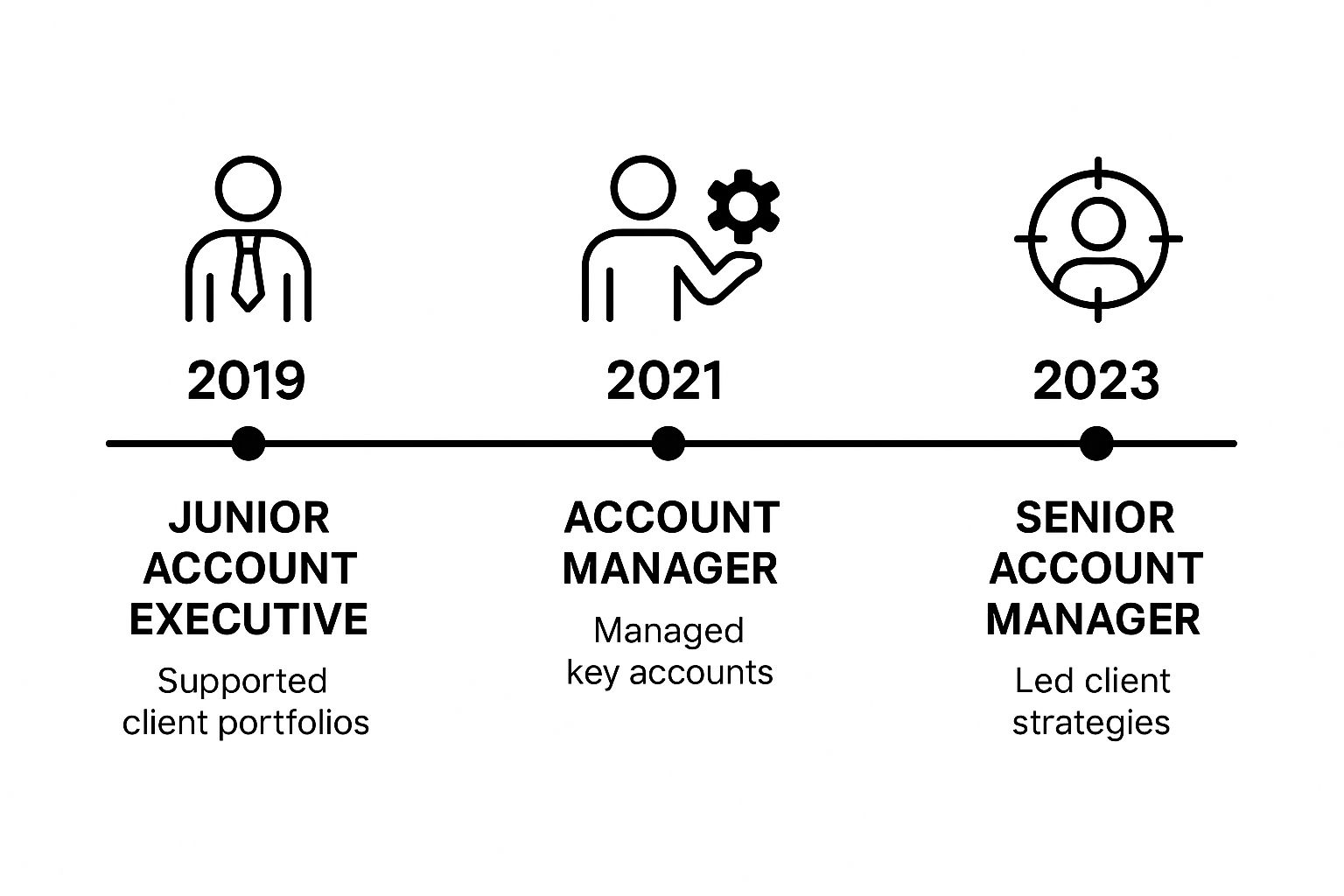
Account Manager Cover Letter: Tips to Land Your Dream Job
Published
Understanding What Modern Employers Really Want
The account manager role isn't what it used to be. It's no longer enough to simply maintain client relationships. Today's account managers are expected to be strategic partners who drive revenue and contribute significantly to a company's overall growth. This evolution requires a new approach to presenting yourself, especially in your account manager cover letter. Simply listing your past experience won't cut it; you need to demonstrate a deep understanding of this redefined role.
The Evolution of the Account Manager
The account manager position has transformed significantly. Historically, the primary focus was on building and nurturing client relationships. The average tenure in the early 2000s was approximately 2.5 years. By 2015, this increased to around 4 years, reflecting the growing importance of long-term client partnerships and highlighting the value of strong interpersonal skills and adaptability. Around 2020, a new trend emerged: companies began looking for Account Managers who could also identify new business opportunities. This continues today, with recruiters actively searching for candidates who can balance relationship building with strategic growth initiatives. To better understand this shift, learn more about the evolving role of the account manager. Your cover letter needs to address these evolving expectations.
For further insight, you might be interested in: How to master the account manager job description
The infographic below illustrates a typical career progression within account management. Note the increasing responsibilities and strategic focus expected at each level.

As the infographic shows, progressing from Junior Account Executive to Senior Account Manager involves a shift from supporting client portfolios to spearheading client strategies. This emphasizes the importance of showcasing your strategic thinking abilities in your account manager cover letter.
Key Skills Modern Employers Seek
Today's employers seek account managers with a combination of technical expertise and emotional intelligence. This translates into several key competencies that your cover letter should highlight:
- Business Acumen: Show a solid understanding of business principles and the ability to contribute to strategic decisions.
- Consultative Selling: Position yourself as a trusted advisor who can effectively identify and address client needs.
- Data Analysis: Demonstrate your proficiency in analyzing data to uncover trends, monitor performance, and inform strategic recommendations.
- Adaptability: Highlight your ability to navigate change and adapt strategies to meet evolving market conditions.
Furthermore, employers value efficiency and organization. Using the right account management tools can significantly enhance performance. Mentioning proficiency in relevant software can further strengthen your application. These in-demand skills are essential for success in today's dynamic business environment and should be clearly articulated in your account manager cover letter.
Why Generic Cover Letters Kill Your Chances

In the competitive field of account management, submitting a generic cover letter is a critical mistake. It conveys a lack of preparation and a disregard for the company’s unique requirements. This often leads to your application being overlooked, regardless of your resume's strengths. A customized account manager cover letter, however, provides a platform to make a strong first impression and showcase your specific value.
Research: Your Secret Weapon
Effective customization begins with in-depth research. This involves going beyond a cursory glance at the company's "About Us" page. Explore their current projects, challenges, and market standing. News articles, press releases, and industry reports can offer valuable insights into the company’s priorities and pain points. For instance, if the company recently launched a new product, emphasize your experience in product marketing and your ability to drive product adoption.
Modern businesses prioritize efficiency and streamlined operations. The right account management tools can significantly enhance performance. Showing familiarity with these tools can give you a competitive edge.
Decoding the Job Description
The job description is a wealth of information about the ideal candidate. Scrutinize the listed responsibilities and required skills. Look for keywords and phrases that indicate the company's values and priorities. Strategically incorporate these keywords in your cover letter. Doing so demonstrates your understanding of their needs and allows you to speak their language. This attention to detail can greatly improve your visibility.
Thorough research not only informs your content but also demonstrates genuine interest. A tailored cover letter shows you’ve invested time in understanding the company and its specific needs. This makes you a more attractive candidate. Furthermore, customization allows you to address the company’s culture directly. Understanding their values and work style allows you to present yourself as a compatible team member.
The Power of Customization
The impact of a well-crafted account manager cover letter is substantial. Studies show that personalized cover letters can increase your interview chances by up to 50%. In 2023, roughly 70% of hiring managers valued cover letters, with 40% stating they wouldn't consider a candidate without one. Learn more about compelling cover letter statistics. These statistics underscore the importance of crafting a personalized cover letter that showcases your understanding of the role and the company. A generic cover letter might lead to your application being disregarded, while a customized one can unlock opportunities.
Building Your Cover Letter Foundation That Works

Forget generic templates. A compelling account manager cover letter needs a strategic structure that immediately grabs the reader's attention and showcases your value. This section breaks down the essential components and provides actionable insights to make your letter stand out. This means going beyond simply listing your qualifications and focusing on demonstrating a real understanding of the role and the company.
The Essential Elements of a Powerful Cover Letter
A successful account manager cover letter follows a clear structure to present your qualifications effectively. Think of it as building a case for why you're the perfect fit. Each element plays a crucial role in persuading the hiring manager.
A Compelling Opening: Your opening sentences must capture the reader's attention and immediately establish your value. Instead of generic greetings, use a personalized opening that demonstrates your research and understanding of the company's needs. This sets the tone for the rest of your letter.
Targeted Body Paragraphs: The body of your letter should tell a story – your professional story. Highlight relevant experiences and accomplishments, showcasing how they align with the specific requirements of the job description. Quantify your achievements whenever possible, using numbers and data to demonstrate your impact. For example, instead of "increased sales," write "increased sales by 15% in Q2."
A Strong Call to Action: Your closing paragraph should be more than just a thank you. It's your last chance to reinforce your interest and encourage the hiring manager to take the next step. Express genuine enthusiasm for the position and reiterate your key qualifications, encouraging the hiring manager to schedule an interview.
Structuring Your Content For Maximum Impact
Consider these structural guidelines to enhance your cover letter’s readability and effectiveness:
Optimal Length: Aim for a concise and focused cover letter, ideally within one page. This ensures the hiring manager can quickly assess your qualifications.
Professional Tone: Maintain a professional and confident tone throughout. Balance enthusiasm with formality, avoiding overly casual language.
Clear Formatting: Choose a clean, easy-to-read font. Use bullet points to highlight key skills and accomplishments, making your letter scannable. Proper formatting improves readability.
Comparing Effective and Ineffective Structures
The table below, "Account Manager Cover Letter Structure Comparison", shows key differences between effective and ineffective account manager cover letters, highlighting optimal paragraph lengths, content focus, and formatting choices.
| Section | Effective Approach | Word Count | Common Mistakes |
|---|---|---|---|
| Opening | Personalized, value-driven introduction | 50-75 | Generic greetings, lack of focus |
| Body Paragraphs | Quantifiable achievements, targeted skills | 200-250 | Vague descriptions, irrelevant details |
| Closing | Strong call to action, reiterates key strengths | 50-75 | Weak closing, lack of enthusiasm |
This table provides a clear comparison of how each section should be approached for maximum impact. Notice how the effective approach emphasizes personalization, quantifiable results, and a proactive closing.
By following these guidelines and focusing on a strong foundation, you can create a compelling account manager cover letter that sets you apart and helps you secure an interview. In the next section, we'll explore how to transform your experiences into compelling success stories.
Transforming Your Experience Into Compelling Success Stories
Your account manager cover letter goes beyond a simple resume summary. It's a platform to showcase your accomplishments and demonstrate your ability to drive results and deliver value. This requires more than listing past roles; it demands compelling success stories that resonate with hiring managers. Let's explore how to transform your experience into narratives that highlight your potential.
Identifying Your Key Accomplishments
Begin by pinpointing your most significant achievements. Reflect on instances where you surpassed expectations, tackled complex problems, or made a quantifiable impact. These accomplishments form the bedrock of your success stories. Did you successfully onboard a key client? Did you significantly boost client retention? Did you implement a new strategy that increased revenue? These are the achievements hiring managers want to see.
Remember accomplishments beyond purely quantitative metrics. While numbers are important, showcasing skills in relationship building, problem-solving, and strategic thinking is crucial. Perhaps you successfully navigated a difficult client negotiation, resolved a complex internal conflict, or spearheaded a successful client retention program. These achievements demonstrate your versatile skill set.
Quantifying Your Successes
Whenever possible, use concrete data to quantify your achievements. Numbers lend credibility and impact to your claims. Instead of stating "improved client satisfaction," quantify the improvement: "Improved client satisfaction scores by 15% over six months." This provides a tangible measure of your contributions.
Not all accomplishments have readily available metrics. If you lack specific numbers, focus on the impact of your work. Explain how your actions positively affected the company or client. For example, describe how implementing a new communication strategy streamlined client interactions, leading to increased efficiency and improved feedback.
The demand for skilled Account Managers is growing, underscoring the importance of a strong cover letter. The market for Account Managers was projected to grow by 10% annually by 2025, with average salaries in the US and Europe ranging from $60,000 to $80,000. This highlights the value placed on professionals adept at managing client relationships and driving revenue growth. Learn more at Teal HQ's Cover Letter Example.
Storytelling With Data
Integrate your quantifiable achievements into compelling narratives using the STAR method (Situation, Task, Action, Result). This framework ensures clear and concise information presentation, allowing hiring managers to grasp the context and impact of your achievements.
- Situation: Briefly describe the background or challenge.
- Task: Explain your specific role and responsibilities.
- Action: Detail the steps you took to address the situation.
- Result: Quantify the positive outcomes of your actions.
By combining data and storytelling, you create a compelling narrative that showcases your accomplishments and positions you as a strong candidate. Connect your past successes to your future potential by explaining how your previous achievements demonstrate your ability to contribute to the company's objectives. This helps the hiring manager envision you as a valuable addition to their team.
Tailoring Your Approach For Different Account Manager Roles

Not all account manager positions are created equal. Your cover letter needs to reflect the specific requirements of each role and the nuances of each industry. A generic, one-size-fits-all approach won’t capture a hiring manager's attention. This section offers targeted strategies for different account manager specializations to help your application stand out.
Industry-Specific Strategies
Different industries demand unique skill sets and experiences. For example, a tech industry account manager needs to demonstrate a solid grasp of software and emerging technologies. A link to relevant software certifications or training programs within the tech industry could further strengthen this point.
In contrast, a healthcare account manager must showcase knowledge of regulatory compliance and medical terminology. Your cover letter should highlight these industry-specific nuances. Advertising account managers need to showcase creativity and marketing acumen, while financial services account managers should emphasize analytical and financial skills. Tailoring your cover letter in this way demonstrates a clear understanding of the industry's unique challenges and opportunities.
Account Type and Company Size
The types of accounts you manage and the size of the company also play a significant role in shaping your cover letter strategy. An enterprise key account manager handling million-dollar clients needs to showcase experience in complex negotiations and strategic relationship building. Conversely, a digital account manager orchestrating online campaigns should emphasize expertise in digital marketing and analytics tools like Google Analytics.
Working at a startup requires a different approach than working for a large corporation. Startups often value adaptability and a hands-on approach, while large corporations may prioritize experience within complex organizational structures. Articulating your understanding of these distinctions in your cover letter is essential.
Transitioning Between Roles
If you’re transitioning between different account management specializations, highlight the transferable skills applicable to the new role. For instance, when moving from a sales role to account management, emphasize your existing client relationship-building skills and ability to close deals.
If you’re transitioning from customer service or project management, focus on your communication, problem-solving, and organizational skills. Clearly demonstrate how your prior experience translates into success in the targeted account management position. Quantifying your accomplishments with metrics, like "improved customer satisfaction by 15%," can further solidify your claims.
Positioning yourself effectively requires careful consideration of each position's unique requirements. Understanding the nuances between Account Manager vs Customer Success roles can be crucial in tailoring your cover letter. Highlight the most relevant skills and experience, tailoring your language to the industry, and showcasing a deep understanding of the company’s business model. This focused approach presents you as a knowledgeable candidate, significantly increasing your chances of securing an interview. For further guidance, resources like the account manager job description can be valuable.
Avoiding The Mistakes That Sink Applications
Landing a coveted account manager position requires more than just a stellar resume. Your cover letter is often the first impression you make on a potential employer, and even seasoned professionals can fall prey to subtle mistakes that can quickly derail their application. This section explores common pitfalls and provides practical strategies for crafting a compelling and professional cover letter that gets noticed.
Beyond The Obvious: Subtle Errors That Matter
While typos and generic language are obvious deal-breakers, more nuanced errors can be equally damaging. For instance, striking the right tone is crucial. An overly casual or excessively formal tone can make you seem out of sync with the company culture. Understanding the nuances of different roles, like the distinctions between an Account Manager vs Customer Success role, is vital for tailoring your letter's tone and focus.
Including irrelevant information is another frequent misstep. Keep your cover letter focused on the experiences and skills that directly relate to the specific account manager role you're applying for. Avoid padding with unrelated details that distract from your core qualifications. This targeted approach demonstrates a clear grasp of the job requirements.
Finally, failing to demonstrate a deep understanding of the account management function can be a significant disadvantage. Showcase your knowledge of key account management principles, strategies, and best practices. Go beyond general statements and illustrate how you’ve successfully applied these principles in previous roles with concrete examples.
Recognizing Red Flags and Implementing Solutions
Hiring managers often look for specific red flags to quickly narrow down the applicant pool. A lack of personalization is one such red flag. Generic cover letters signal a lack of effort and genuine interest. Tailor each letter to the specific role, highlighting how your skills and experience align with the company's particular needs.
Another red flag is a failure to quantify achievements. Instead of simply listing responsibilities, showcase measurable results that demonstrate your impact. For instance, "Increased client retention by 12%" is significantly more impactful than "Managed client relationships."
Inconsistencies in formatting and tone can also raise concerns about your attention to detail. Ensure your cover letter is well-organized, easy to read, and maintains a consistent professional tone throughout.
To help you identify and correct these common errors, let's look at the following table. It outlines typical mistakes, explains why they're problematic, and provides better alternatives with specific examples.
The following table highlights common mistakes found in Account Manager cover letters, explains why they hinder your application, and offers effective solutions with examples.
| Mistake | Why It Hurts | Better Approach | Example Fix |
|---|---|---|---|
| Generic opening | Shows lack of interest in the specific company | Tailor the opening to address the company’s specific needs and your understanding of their work. | Instead of "Dear Hiring Manager," use "Dear [Hiring Manager Name], I am writing to express my keen interest in the Account Manager position at [Company Name], particularly because of [Company's specific initiative or achievement]." |
| Listing duties instead of accomplishments | Fails to showcase your impact and value | Quantify your achievements with metrics and data. | Instead of "Managed client accounts," write "Increased client retention by 15% through proactive communication and personalized service." |
| Irrelevant experience | Wastes the reader's time and dilutes your key strengths | Focus only on experiences directly relevant to the target role. | Instead of detailing your summer job as a cashier, highlight your experience leading client presentations and negotiating contracts. |
| Inconsistent tone | Creates a sense of unprofessionalism | Maintain a consistent professional tone throughout the letter. | Avoid overly casual language or excessive jargon. Ensure the tone matches the company culture. |
| No company research | Suggests a lack of genuine interest | Demonstrate your understanding of the company's mission, values, and recent achievements. | Mention specific company initiatives, products, or news items that resonate with you and relate to the role. |
This table provides a framework for identifying and correcting common errors, ultimately strengthening your cover letter and increasing your chances of securing an interview.
Mastering Editing and Proofreading Techniques
Effective editing and proofreading are essential for a polished final product. Start by reviewing your letter for clarity and conciseness. Eliminate jargon and unnecessary words, focusing on a clear, concise message.
Next, meticulously check for grammatical errors, spelling mistakes, and punctuation issues. These errors can undermine your credibility. Consider using grammar checking tools like Grammarly and having a trusted friend or colleague review your letter for a fresh perspective. You can also find helpful resources online like this article on How to master the application follow-up email which offers valuable tips on maintaining contact after submitting your application.
By avoiding these common mistakes and implementing these strategies, you can significantly improve your cover letter. A polished and professional letter demonstrates attention to detail and showcases your value, setting you apart from the competition and paving the way for interview success. Remember, your cover letter is your first impression – make it count.
Your Complete Action Plan For Cover Letter Success
This section provides a practical roadmap for crafting an account manager cover letter that opens doors to interview opportunities. We'll guide you step-by-step, from initial research to post-submission follow-up, covering everything you need for cover letter mastery.
Research and Preparation: Laying the Groundwork
Before writing your cover letter, invest time in thorough research. Understand the company's culture, values, and recent achievements. Look beyond the "About Us" page. Explore news articles, press releases, and industry reports to grasp their current challenges and strategic priorities. This research will shape your cover letter, allowing you to tailor your message and present yourself as the solution to their specific needs. For example, if they recently expanded into a new market, highlight your experience with market entry strategies.
Next, carefully analyze the job description. Identify keywords, required skills, and key responsibilities. This provides valuable insights into the hiring manager's expectations. Incorporating these keywords demonstrates your understanding of the role and improves your chances of getting past Applicant Tracking Systems (ATS).
Drafting Your Compelling Narrative: Structure and Content
Once your research is complete, structure your cover letter. Start with a personalized opening that captures the reader's attention and immediately showcases your value. Avoid generic greetings. Instead, mention a specific company achievement or initiative that resonates with you, demonstrating genuine interest. You might find value in this article: How to master the after-interview email sample, which highlights the importance of communication throughout the hiring process.
The body of your cover letter should showcase your most relevant accomplishments. Use the STAR method (Situation, Task, Action, Result) to structure your success stories. Quantify your achievements whenever possible, using concrete data to demonstrate your impact. For example, instead of "improved client relationships," write "increased client retention by 12% through proactive communication and personalized service."
Finally, create a strong call to action. Reiterate your key qualifications, express enthusiasm for the position, and clearly state your interest in an interview. This proactive approach encourages the hiring manager to move forward with your application.
Refining Your Message: Editing and Proofreading
Before submitting your cover letter, meticulously review it for clarity, conciseness, and grammatical accuracy. Eliminate jargon, maintain a professional tone, and double-check for spelling and punctuation errors. These details significantly impact how your application is perceived. Consider using grammar checking tools like Grammarly and seeking feedback from a trusted friend or colleague.
Following Up Strategically: Staying Top-of-Mind
Following up after applying demonstrates continued interest and keeps you top-of-mind. A well-timed follow-up email can reinforce your qualifications and reiterate your enthusiasm. Avoid being overly persistent. A single, professional email a week or two after applying is generally sufficient.
Tracking Your Progress and Continuous Improvement
Track your application success rate. Note which cover letters generate positive responses and which fall short. Analyze the differences and identify areas for improvement. This feedback loop helps refine your approach and improves your chances of landing your dream account manager role.
Realistic Timelines and Managing Multiple Applications
Crafting a compelling cover letter takes time. Allocate sufficient time for research, drafting, editing, and personalization. Rushing can lead to generic, ineffective letters. When applying for multiple positions, create a system for tracking applications, customizing each cover letter, and managing follow-up communication. This organized approach ensures personalized and professional applications throughout your job search.
Staying Motivated Throughout the Journey
Job searching can be challenging. Maintain a positive attitude, celebrate small victories, and stay focused on your goals. Networking, attending industry events, and continually developing your skills can help you stay motivated and enhance your prospects. Remember, each application is a step forward, and every interview is a learning opportunity.
Are you ready to advance your influencer marketing career? Explore opportunities in this dynamic field by visiting Influencer Marketing Jobs. Connect with leading brands and agencies seeking talented professionals. Start your job search today!